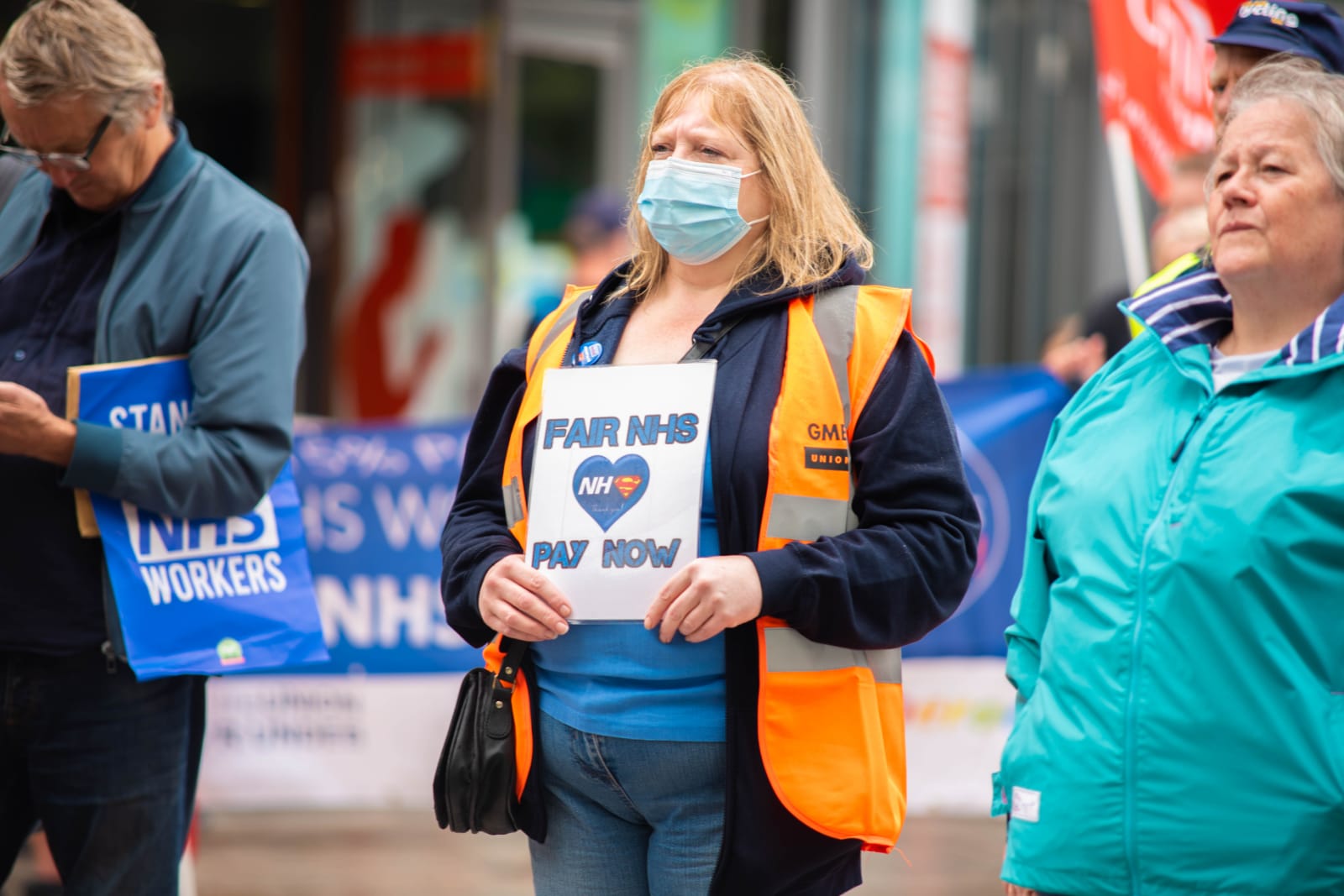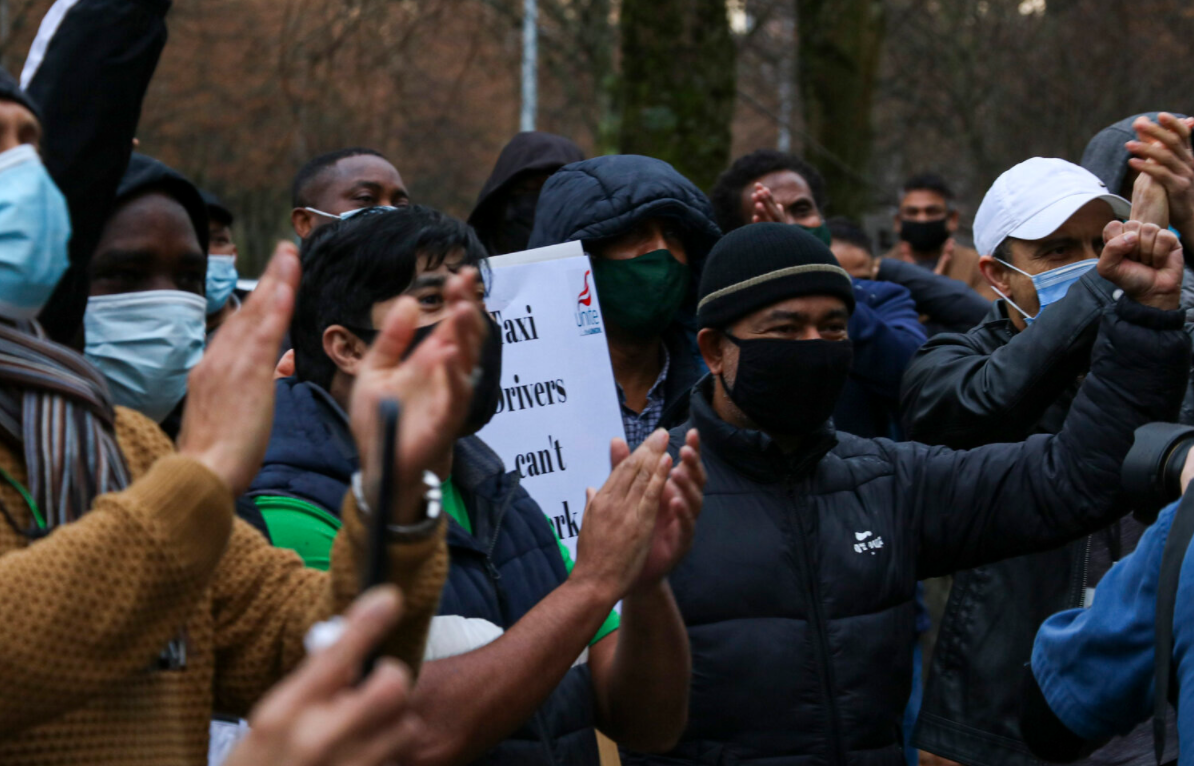
Major Union Hits Out At Welsh Government Over Public Sector Pay & Social Care, Warns Of Winter Strikes
- UNISON says that Welsh Labour must create a National Care Service and fulfil its election promise to raise worker pay
- The union is recommending its members reject low pay offers in health and local government, paving the way for winter strikes
- Welsh Labour faces its biggest challenge since the election, with a poverty crisis and growing anger among workers
Image: Head of local government for UNISON Cymru Wales, Dominic MacAskill, has warned of a ‘winter of discontent.’ via Facebook
Wales’ biggest public sector, which represents thousands of workers in care, the NHS and local government, has said that multiple strikes against low pay deals in the public sector are on the cards.
UNISON Cymru Wales has also demanded that the Welsh Government urgently raise the pay of care workers and develop a National Care Service similar to the NHS.
The union points to the Welsh Labour government’s manifesto commitment to raise care worker pay and is angry over low pay deals being forced on public sector workers, including a below inflation 1.75% rise for council workers – effectively a pay cut.
Meanwhile, all major health unions including UNISON are expected to announce the outcome of consultative pay ballots in the NHS in the coming weeks.
Union members in the NHS have been urged to reject a 3% pay deal. This could pave the way for a pay strike in the health service, which workers say is needed to address the falling living standards of staff on low pay and the crisis in the NHS.
Frustration among workers has also been fuelled by Boris Johnson’s plan to raise National Insurance contributions, which would all but wipe out the already low pay deals.
Commenting on the public sector pay situation, Shavanah Taj, secretary of the Wales TUC, urged the Welsh Government to start negotiating with unions or face a winter of discontent.
“Public sector workers in Wales demand recognition and real value for their hard work and commitment, during [the] pandemic and beyond,” she said, adding that unions were starting to organise for action.
Dominic MacAskill, Head of local government for UNISON Cymru Wales, said that members are angry with the falling rate of pay, saying that the lowest paid workers are getting “what amounts to a wage cut.”
Mr MacAskill, pictured above, says the union was “most disappointed” with Welsh Government over the imposition of the NHS pay deal.
“There was no effort at negotiation. No contact with unions. It was 3%, and that’s it. And that’s not good enough,” he said, adding that if members across the public sector vote for strikes, and Welsh Government does not improve its pay offers, “I’d expect industrial action to start perhaps at the end of November and beginning of December.”
A wave of winter strikes would present one of the biggest political challenges faced by Welsh Labour since its successful election performance in May, which saw the party outperform expectations to form a majority government.
But workers are becoming increasingly frustrated after a decade of falling pay and tumbling living standards, especially those who had to go out to work during the pandemic.
Welsh Labour is already under serious pressure over its refusal to extend Free School Meal provision, even though Wales has the highest child poverty rate in the UK and the least generous allocation of free lunchtime meals to children from poorer households.
Winter strikes could also break the culture of silence around the damaging effects of Westminster-driven austerity in Wales.
The Tory UK Government – which controls welfare payment in Wales – is ploughing ahead with a planned cut to Universal Credit, hitting thousands of people in poverty across Wales. Welsh Labour First Minister Mark Drakeford is yet to criticise the measure.
Any action by workers over the question of poverty pay would put Drakeford under huge pressure. If strikes were coordinated with workers in other nations, such as NHS England staff, then the fallout would be even more serious for Boris Johnson.
Social care crisis
UNISON says that many care workers are suffering in-work poverty due to chronically low pay across the sector, and that Welsh Labour must honour its election promise to raise pay.
The call came last week in response to Prime Minister Boris Johnson’s announcement on social care, where the Tories will raise National Insurance contributions for all workers in the UK.
Responding to the Prime Minister’s announcement on social care yesterday (Tuesday), UNISON Cymru Wales says there is now an onus on the Welsh to lift care workers out of poverty and develop a national care service for Wales.
The union criticised Boris Johnson for failing to say how care workers’ livelihoods would be improved or how a broken social care system could be fixed.
If left untouched,As they are , the Tory government’s plans will leave a dysfunctional system intact and do nothing to address widespread profiteering by care home bosses.
But the additional money raised through the tax rise will mean that the Welsh Government will receive extra funding from the UK treasury.
Wales could lead the way in the development of a national care service, UNISON says, which would put quality of care, dignity and respect for workers at its core, issues that were absent from Boris Johnson’s announcement.
But the union says the Welsh Government must also implement its manifesto commitment of a £9.50 minimum wage for care workers immediately.
Welsh Labour made the pledge ahead of elections in May but has so far failed to enact it, even though it is widely backed by the public.
Mark Turner, UNISON Cymru Wales lead officer for care, said that now was the time for politicians in Cardiff Bay to act.
“Welsh government was elected on a manifesto commitment to boost the earnings of care workers,” he said.
“They need to do that now and present a plan for HOW wages will increase further to the level of NHS staff.”
“Boris Johnson wants to introduce a regressive tax rise and he’s plucked figures from the air. He has no idea of what a properly funded care system would look like.”
The National Insurance rise by the UK Government was also attacked by Shavanah Taj, General Secretary of Wales TUC, who said that the Tories should raise Capital Gains Tax to provide long term funding.
“Any plan to fix Social Care must also fix low pay and& job insecurity for workers,” she wrote.
Ms Taj said that more than half of the Welsh care workforce were now working for private care firms, and were “less likely to get proper sick pay [or] maternity pay,” adding that most care workers are women, and that Black women and women from minority backgrounds were overrepresented in the private sector.
She called for a UK- wide solution but if this fails, said the Welsh Government should consult on an alternative solution for Wales.
“It is plain wrong that under current tax arrangements a low paid social care worker can pay a bigger share of their income to fund the social care system than the private equity magnate who profits from asset stripping care homes to sell on,” she wrote.
Meanwhile, health workers currently campaigning for a 15% pay rise said the measure would affect the lowest paid workers the most, and make the proposed 3% pay rise for the NHS “worth even less.”
The campaign group NHS Workers Say No, a coalition of health workers from various unions, said the rich should be made to pay.
“Health and social care should be government funded and we should tax the rich that have clearly benefited off the back of this pandemic,” the group said. “Yet again people in the lowest paid jobs will have to pay for the crisis in social care whilst the wealthiest remain unaffected.”
Backlash over pay
The anger of the National Insurance rise comes as UNISON has also said that there could be major strikes over public sector pay, not just in the NHS and local government, but also in Police support services.
There is also a growing backlash over the 1.75% pay offer to local government workers from the Welsh Government, with UNISON recommending its members reject it and move towards industrial action.
Alison Boshier, a Ceredigion council worker recently told Herald.Wales that workers are deeply frustrated and don’t feel valued:
“When everyone else was locked down, our members were the carers who went to people’s homes to look after them….Our reward for that is a 1.75% pay increase that doesn’t even keep up with inflation.”
Taking the proposed National Insurance rise into account, the rise would be reduced to just 0.5%, way below the rise in living costs. As such, UNISON has said that strikes could happen from the end of November.
In the past 18 months, the essential role of key workers in the public and private sector in keeping society functional has come to the fore.
Many are now furious that they are expected to live off low pay in a system that created a record number of billionaires during the pandemic.
In a sign of the prevailing mood, strike ballots have also been sent out today for Unite members at Stagecoach Wales.
“For too long bus drivers have been under appreciated and under paid,” the union said. “These essential workers will not sacrifice terms and conditions just to financially survive.”
To alter the crisis facing essential workers across the board, coordinating winter strikes could be the best hope.



1 Comment
Comments are closed.